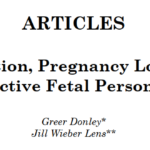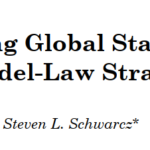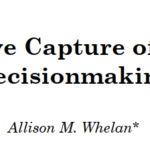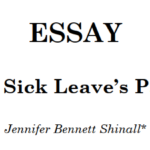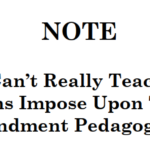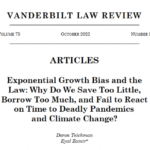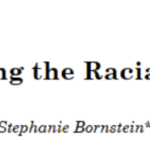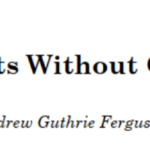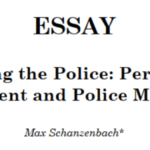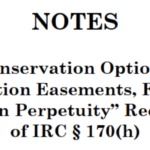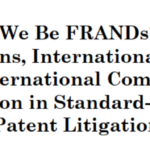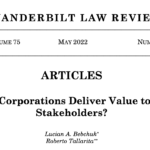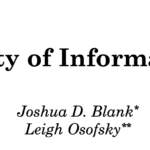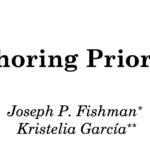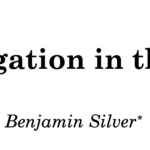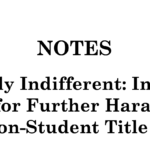Volume 75 Category
Abortion, Pregnancy Loss, & Subjective Fetal Personhood
Nov. 22, 2022—Greer Donley & Jill Wieber Lens | 75 Vand. L. Rev. 1649 Long-standing dogma dictates that recognizing pregnancy loss threatens abortion rights—acknowledging that miscarriage and stillbirth involve the loss of something valuable, the theory goes, creates a slippery slope to fetal personhood. For decades, antiabortion advocates have capitalized on this tension and weaponized the grief...
Regulating Global Stablecoins: A Model-Law Strategy
Nov. 22, 2022—Steven L. Schwarcz | 75 Vand. L. Rev. 1729 Digital currencies have the potential to improve the speed and efficiency of the payment system. The principal challenge is retail: to facilitate day-to-day payments among consumers as an alternative to cash, both domestically and across national borders. Two models of digital currencies are becoming viable: central...
Executive Capture of Agency Decisionmaking
Nov. 22, 2022—Allison M. Whelan | 75 Vand. L. Rev. 1787 The scientific credibility of the administrative state is under siege in the United States, risking distressful public health harms and even deaths. This Article addresses one component of this attack—executive interference in agency scientific decisionmaking. It offers a new conceptual framework, “internal agency capture,” and policy...
Paid Sick Leave’s Payoff
Nov. 22, 2022—Jennifer Bennett Shinall | 75 Vand. L. Rev. 1879 Perhaps paid sick days have never been more valuable than during the COVID-19 pandemic. Yet even before COVID-19, seventeen states and the District of Columbia began passing legislative mandates that employers provide employees with paid sick leave (“PSL”) days. Most of this legislation requires employers to...
Can’t Really Teach: CRT Bans Impose Upon Teachers’ First Amendment Pedagogical Rights
Nov. 22, 2022—Mary Lindsay Krebs | 75 Vand. L. Rev. 1925 The jurisprudence governing K-12 teachers’ speech protection has been a convoluted hodgepodge of caselaw since the 1960s when the Supreme Court established that teachers retain at least some First Amendment protection as public educators. Now, as new so-called Critical Race Theory bans prohibit an array of...
Exponential Growth Bias and the Law: Why Do We Save Too Little, Borrow Too Much, and Fail to React on Time to Deadly Pandemics and Climate Change?
Oct. 20, 2022—Doron Teichman & Eyal Zamir | 75 Vand. L. Rev. 1345 Many human decisions, ranging from the taking of loans with compound interest to fighting deadly pandemics, involve phenomena that entail exponential growth. Yet a wide and robust body of empirical studies demonstrates that people systematically underestimate exponential growth. This phenomenon, dubbed the exponential growth...
Confronting the Racial Pay Gap
Oct. 20, 2022—Stephanie Bornstein | 75 Vand. L. Rev. 1401 For several decades, a small body of legal scholarship has addressed the gender pay gap, which compares the median full-time earnings of women and men. More recently, legal scholars have begun to address the racial wealth gap, which measures racial disparities in family economic security and wealth...
Courts Without Court
Oct. 20, 2022—Andrew Guthrie Ferguson | 75 Vand. L. Rev. 1461 What role does the physical courthouse play in the administration of criminal justice? This Article uses recent experiments with virtual courts to reimagine a future without criminal courthouses at the center. The key insight of this Article is to reveal how integral physical courts are to...
Policing the Police: Personnel Management and Police Misconduct
Oct. 20, 2022—Max Schanzenbach | 75 Vand. L. Rev. 1523 Police misconduct is at the top of the public policy agenda, but there is surprisingly little understanding of how police personnel management policies affect police misconduct. Police-civilian interactions in large jurisdictions are, in principle at least, highly regulated. But these regulations are at least partially counteracted by...
Conservation Options: Conservation Easements, Flexibility, and the “In Perpetuity” Requirement of IRC § 170(h)
Oct. 20, 2022—Molly Teague | 75 Vand. L. Rev. 1573 Conservation easements have been closely tied to tax incentives since the 1970s, when Congress passed legislation to encourage land preservation. In an attempt to balance the desire to conserve more land with the desire to prevent tax abuses, Congress later passed § 170(h) of the Internal Revenue Code,...
Why Can’t We Be FRANDs?: Anti-Suit Injunctions, International Comity, and International Commercial Arbitration in Standard-Essential Patent Litigation
Oct. 20, 2022—Raghavendra R. Murthy | 75 Vand. L. Rev. 1609 Picking up a smartphone to contact someone across the globe is facilitated by technical standards like 5G. These standards allow for technological compatibility worldwide. For instance, a 5G capable device can connect to 5G networks anywhere in the world because the same 5G standard is used...
Will Corporations Deliver Value to All Stakeholders?
May. 18, 2022—Lucian A. Bebchuk & Roberto Tallarita | 75 Vand. L. Rev. 1031 (2022) | Amid growing concerns for the effects that corporations have on stakeholders, supporters of stakeholder governance advocate relying on corporate leaders to use their discretion to protect stakeholders, and they seem to take corporate pledges to do so at face value. By contrast, critics...
The Inequity of Informal Guidance
May. 18, 2022—Joshua D. Blank & Leigh Osofsky | 75 Vand. L. Rev. 1093 (2022) | The coexistence of formal and informal law is a hallmark feature of the U.S. tax system. Congress and the Treasury enact formal law, such as statutes and regulations, while the Internal Revenue Service offers the public informal explanations and summaries, such as...
Authoring Prior Art
May. 18, 2022—Joseph P. Fishman & Kristelia García | 75 Vand. L. Rev. 1159 (2022) | Patent law and copyright law are widely understood to diverge in how they approach prior art, the universe of information that already existed before a particular innovation’s development. For patents, prior art is paramount. An invention can’t be patented unless it is...
Nondelegation in the States
May. 18, 2022—Benjamin Silver | 75 Vand. L. Rev. 1211 (2022) | American public law is on the precipice of a nondelegation revival. Yet scholars have largely ignored the greatest wellspring of American nondelegation law: that of the states. As a result, the nondelegation literature is badly in need of a broad and deep examination of state nondelegation....
Deliberately Indifferent: Institutional Liability for Further Harassment in Student-on-Student Title IX Cases
May. 18, 2022—Jacob R. Goodman | 75 Vand. L. Rev. 1273 (2022) | Sexual harassment is an unfortunate problem far too many have experienced. Universities and other educational institutions owe a duty, both legal and moral, to protect students from sexual harassment, and in turn to allow students to receive the full benefits of their education. But a...
